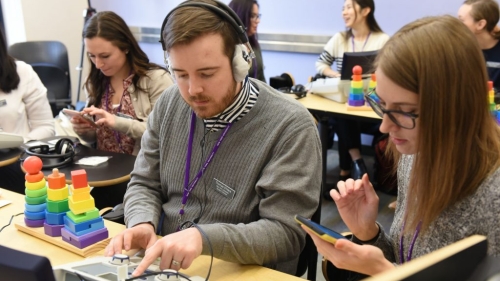Sonja Molfenter, associate professor of communicative sciences and disorders, has been awarded a $3.77 million grant from National Institutes of Health’s (NIH’s) National Institute on Aging to study the effects of protein intake and exercising the swallowing muscles to prevent frailty in older adults.
Fifteen percent of older adults suffer from difficulty swallowing, or dysphagia, which can have devastating consequences on an individual’s health. While other studies in this vein of research have examined strengthening of the tongue, Molfenter’s research looks at the muscles of the pharynx, which are more difficult to access but also arguably more influential in executing a safe and efficient swallow.
“My lab has been working to understand the natural course of age-related changes to swallowing function,” says Molfenter. “My last NIH grant allowed us to confirm that the pharyngeal muscles inside the throat that are instrumental for swallowing experience age-related atrophy — just like other muscles in the body — and that there are negative consequences for how efficiently someone swallows as a result. This grant is the next step in that program of research to see what can be done to prevent or counteract this decline in the pharyngeal muscles.”
Molfenter’s research involves a multidisciplinary team of co-investigators, including Kathleen Woolf, associate professor of nutrition and food studies at NYU Steinhardt. Several experts from NYU Langone Health include Milan Amin, MD and Matina Balou, PhD (a laryngologist and speech language pathologist in otolaryngology, respectively); Mari Hagiwara, MD (radiology); and Thaddeus Tarpey, PhD (population health).

The study targets adults over the age of 65 who qualify as “pre-frail” on the FRAIL Scale, which is a series of screening questions administered over the phone. Once selected, participants will undergo a comprehensive battery of tests to assess their pharyngeal muscles, including video fluoroscopy (which is like an x-ray video of swallowing function), as well as MRI imaging and high-resolution pharyngeal manometry. This three-fold approach will give researchers insight into participants’ existing muscle function, composition, and strength, respectively.
Next, with the help of a graduate student clinician, participants will engage in 12 weeks of exercises designed to strengthen their pharyngeal muscles. “These exercises are used routinely for treating patients with swallowing disorders, but this is the first time we’re using them as preventative measures in older adults,” says Molfenter.
Participants will also be randomized to consume additional protein drinks to see if this also leads to increased strength and better outcomes. At the end of the 12 weeks, the three medical tests will be administered again to examine potential improvements to the pharyngeal muscles.
“We’re interested first in whether these exercises and increased protein intake have an immediate effect on the strength and function of the pharyngeal muscles,” says Molfenter. “In the long term, we would love to be able to evaluate the continued benefits from these exercises as people age. For example, do improved pharyngeal muscles lead to better recovery after illness and disease? These exercises could also be useful in populations we know will experience swallowing muscle decline over time, such as those with ALS or Parkinson’s disease.”
Molfenter’s grant (#R01AG079907) was funded through Steinhardt’s Center of Health and Rehabilitation Research (CoHRR).

